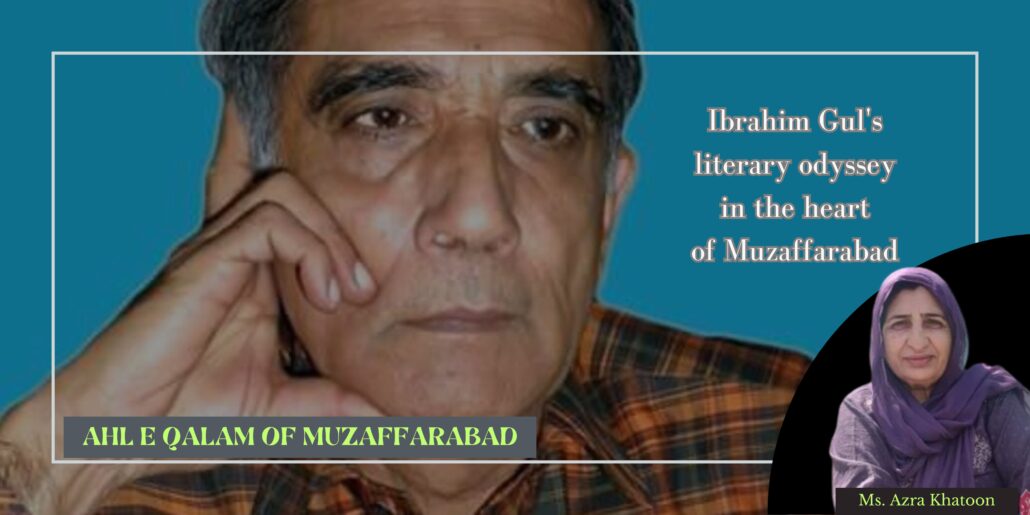
Azra Zahra
One February afternoon in 2011, while navigating the bustling bazaar of Muzaffarabad, I ascended a narrow staircase and stumbled upon a set of small rooms on the second floor. Despite one door being slightly ajar with scattered wood inside, a sudden fear drove me to rush downstairs, unsure of where it might lead.
I sought guidance from the shopkeepers to pinpoint the location of a newspaper man’s residence. Following their directions, I returned to the same spot and eventually contacted Ibrahim Gull over the phone to confirm his dwelling.
Upon receiving the confirmation, I climbed the stairs again and, as I ventured closer to the doorway, a voice beckoned me inside. The familiar tone resonated with “Mira Ji,” though this time, it was Ibrahim Gul, known as “Gul Bhai.”
Inside the room, two mattresses lay on the floor, one occupied by Gul bhai and the other adorned with mobile phones, cigarette packs, and assorted items whose specifics elude my memory. The room itself resembled more of a storage space than a living area. This marked my second encounter with Gul Bhai, the first being entirely coincidental. He belonged to the Majzoob clan, dedicated individuals who prioritize their goals over worldly glamour, yet their significant contributions in literature and journalism often go unacknowledged.
Born in 1955 in the city of Iqbal, Sialkot, Ibrahim Gul, son of the renowned comedian “Azar Askari,” later migrated to Muzaffarabad. His upbringing, coupled with his father’s wide social circle, shaped his oratory skills. Gulbhai’s parents had settled there after migrating in 1947. His father hailed from Srinagar, while his mother was originally from Jammu. Gulbhai commenced his primary education in Sialkot. In 1962, due to his father’s work in Muzaffarabad, Gulbhai, accompanied by his mother, also relocated to Muzaffarabad, where he pursued his education up to a BA Honors degree.
His father’s extensive network of friends in Muzaffarabad played a crucial role in shaping Ibrahim’s communication skills. Gul Ibrahim’s father, Azar Askari, needs no introduction for his comic poetry. In 1975, “Kisht-i Zafaran” turned all of Muzaffarabad into a saffron kingdom. Following in his father’s footsteps, Ibrahim has a great stash of unpublished humorous and satirical poems and verses.
اے ملکِ خداداد تو قسمت ہے ہماری
اب تجھ کو بہر طور بنانا ہی پڑے گا
ہے تلخ مگر اہلِ وطن سچ بھی یہی ہے
چینی کے لیۓ چین تو اب جانا ہی پڑے گا
Translation:
Oh blessed homeland, it’s our fate indeed,
Now we must forge you in a different creed.
Bitter it is, yet truth speaks unbowed,
China for sugar, this path we must plough.
Not only did his poetry resonate with the unfairness in the social order, but also does he express his want to change the wrongs in it:
جھوٹ بولو، کم تولو، ملاوٹ بھی کرو
اسطرح چمکے گا قسمت کا ستارہ دیکھنا
Translation:
Speak lies, weigh less, even mix deceit,
Thus shall the star of destiny brightly greet.
The individual engaged in this task sits upon a humble rug within the confines of a diminutive chamber, its walls shaken by the tremors of his abode, offering him no refuge. The intricacies of fate dictate that during his worldly existence, eyes remain shut, and faces turned away. Yet, upon departing this realm, mausoleums arise in his honor, his mortal remains venerated, his words esteemed, and bonds of kinship forged in his wake.
Within this circle, which included individuals like Jawad Jafari, Huzoor Imam Kazmi, and Arshad Geelani, Ibrahim earned respect from all the scholars of Muzaffarabad. His charming nature endeared him to many, and within this close-knit community, he was held in high regard. The affectionate way in which people regarded Gul Ibrahim often resembled the love one might feel for an exceptionally endearing child due to his innocent and gentle demeanor.
The irony of life surfaces in how individuals are often unacknowledged during their existence but venerated posthumously, echoed in references to renowned figures like Ghalib and Faiz.
Ibrahim Gul, too, faced adversity, losing his house and wife to the 2005 earthquake. Now, with his children in mind—a son pursuing a BS degree and a daughter engaged in an MSc program—Gul Ibrahim relentlessly strives to navigate life’s challenges.
His multifaceted involvement in Azad Kashmir Radio as an announcer, compere, and dramatist alongside his commitment to the newspaper and poetic endeavors underscores his unwavering dedication. His poetry, intertwining bitter truths with a touch of humor, skillfully reveals hidden sorrow, resembling the act of wrapping a bitter pill in honey, his unique artistic expression.
Rooted in Kashmir and deeply connected to Muzaffarabad, Ibrahim Gul endeavors to transform his city into a haven, akin to a blossoming garden. Acknowledging his efforts and extending support becomes both a rightful gesture and a fundamental need, recognizing his tireless pursuit of uplifting his surroundings.
His compositions, such as “Rag Darbari” and “Hunger, Debt, and Poverty,” vividly illustrate societal challenges, blending humor with the poignant reality of a nation grappling with despair and hunger. Ibrahim Gul’s profound insight often masks deep sorrow behind laughter, an eloquence that encapsulates the nation’s collective emotions.
یوں تو سب راگ ہیں بہت اچھے
سب سے اچھا ہے راگ درباری
اسکے گانے سے حل مسائل ہوں
وہ گھریلو ہوں چاہے سرکاری
Translation
“Though all tunes are truly fine,
Finest of all is Rag Darbari’s line.
Its melodies unravel problems deep,
Be they domestic or those the realm does keep.”
The nation’s intoxication and destitution deeply resonate within Gul Ibrahim. They grow so bitter that eventually, the age’s sighs find their way onto his tongue.
جھانک کر کشکول کے اندر دیکھا بھوک تھی
بھوک سے ٹوٹے گا یہ کشکول سہی ا یک دن
قرض لیکر آئی ایم ایف سے جو پیتے ہیں تو کیا
رنگ لاۓ گی ہماری فاقہ مستی ایک دن
Translation
Peeking into Kishkol, hunger lay inside,
One day this Kishkol will break from its hunger’s tide.
What if from IMF loans we sip to survive?
Our hunger will someday paint our lives alive.
